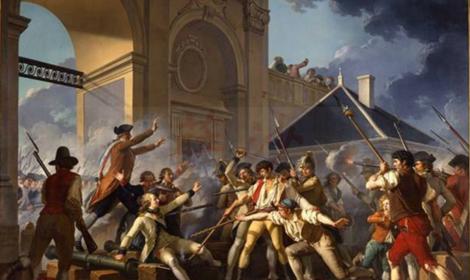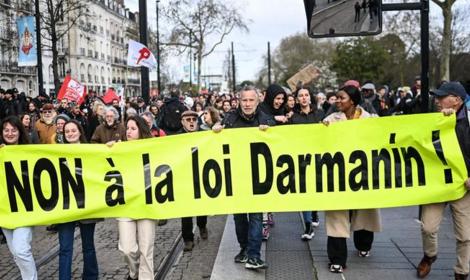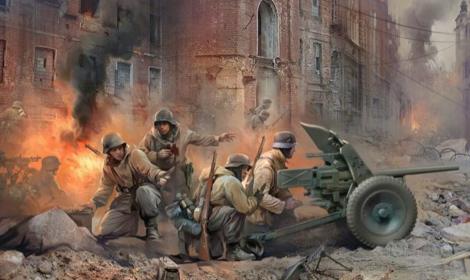法国大革命后的法国是什么样的政府?(二)
正文翻译
What type of government was France after the French Revolution?
法国大革命后的法国是什么样的政府?
法国大革命后的法国是什么样的政府?
评论翻译
Michel Proulx
Who bankrolled the French Revolution?
It’s rather simple: Swiss bankers. Necker was one. They wanted a central reserve bank, and they got it thanks to a process similar to the one they used to get the American Federal Reserve Bank. In America, they battled for a century against presidents who resisted , before they managed to circumvent Wilson, who went on saying he had unwittingly betrayed his country.
In France, they had a few helpers, but only got what they wanted with Napoleon.
However, I very strongly doubt that Jewish bankers had that much influence. Never underestimate Calvinist bankers…
谁资助了法国大革命?
很简单:瑞士银行家。内克尔(Necker)就是其中之一。他们想要一个中央储备银行,这要归功于一个类似于他们建立美国联邦储备银行的过程。在美国,他们与抵制的总统斗争了一个世纪,直到他们成功绕过威尔逊,威尔逊一直说他无意中背叛了他的国家。
在法国,他们有一些帮手,但只从拿破仑那里得到了他们想要的。
然而,我非常怀疑犹太银行家是否有那么大的影响力。永远不要低估加尔文主义的银行家…
John Paddocks
Did the French Revolution yield a positive result for France?
this answer took me over half an hour to type so i am thankful of you all taking the time to read it:) up-votes greatly appreciated:)
In the long term it yielded a positive result as it made France independent from their monarchy’s rule. It also encouraged other countries to rebel against there rulers such as Ireland with Theobald Wolfe Tone against the British rulers in 1798.
But in the short term things wasn’t so good.
It lead to the reign of terror where around 40,000 people died and 6,000 of them in Paris alone.
It lead to the rise of Napoleon Bonaparte who started wars throughout Europe where around five million people died but like a few other people, one of the reasons of his downfall was the failed French invasion of “Russia”.
So depending on what way you look at it the French revolution had its ups and downs just like every other war.
法国大革命给法国带来了积极的结果吗?
这个答案我花了半个多小时打字,所以我很感谢你们花时间阅读,非常感谢点赞
从长远来看,它产生了积极的结果,使法国摆脱了君主制的统治。它还鼓励其他国家反抗那里的统治者,比如1798年,西奥博尔德·沃尔夫·托内在爱尔兰反对英国统治者
但从短期来看,情况并不是那么好。
它导致了恐怖统治,约有40000人死亡,其中仅巴黎就有6000人死亡。
这导致了拿破仑·波拿巴的崛起,他在整个欧洲发动了战争,约有500万人死亡,但与其他少数人一样,他倒台的原因之一是法国入侵“俄国”失败。
所以这取决于你怎么看待它,法国革命就像其他战争一样起起伏伏。
Fran?ois Chlier
Because of the “bourgeoisie”, the wealthy middle class, who were kept as second class citizens because they were commoners and not aristocrats. They created wealth, paid heavy taxes and had no political power. Besides, the whole 18th century had seen an economic and cultural boom with big freedom of expression, and a tradition of political criticism had appeared with Voltaire, Montesquieu and Rousseau. Despite the image of peasant and urban mobs, all the leaders of the Revolution were from bourgeois families, or else they would not have had an education. It took highly literate people to create such a system.
France was not the only country to have a “bourgeoisie”. The other countries who had a wealthy middle class happened to be protestant ones. Britain and Sweden had parliamentary systems, so that wealthy commoners had their word to say. The Netherlands and Switzerland had semi-republican systems from their beginning, and aristocracies hardly existed. Germany was a bunch of absolutist statelets, but there was a number of free cities where merchants held all the power. The French system remained very rigid and not adapted to modern realities, as an absolute monarchy supported by a very conservative church. So were Spain, Austria or Italian states, but these had weak bourgeoisies.
因为“资产阶级”,富裕的中产阶级,他们被保留为二等公民,因为他们是平民而不是贵族。他们创造财富,缴纳重税,却没有政治权力。此外,整个18世纪经济文化繁荣,言论自由极大,伏尔泰、孟德斯鸠、卢梭等人形成了政治批评的传统。尽管有农民和城市暴民的形象,但革命的所有领导人都来自资产阶级家庭,否则他们就不会接受教育,只有受过高等教育的人才能创造这样的体制。
法国并不是唯一一个拥有“资产阶级”的国家。其他拥有富裕中产阶级的国家恰好是新教国家。英国和瑞典都有议会制度,所以富有的平民有发言权。荷兰和瑞士从一开始就实行半共和制,贵族几乎不存在。德国是一群专制小国,但也有一些自由城市,商人掌握着所有的权力。作为一个由非常保守的教会支持的绝对君主制,法国的制度仍然非常僵化,不适应现代现实。西班牙、奥地利或意大利国家也是如此,但这些国家的资产阶级就很势弱了。
It took a financial crisis and several bad harvests in a row, so that accumulated tensions broke out, and the angry mob attacked the Bastille prison on the 14th of July 1789. It was a symbol, since political prisoners were kept there, but only seven were still left there at the time. No one suspected the hallucinating events of the following years, nor the impact they would have on the world.
France was not the first country to have a republic, not the first to have a revolution, not the first to have a constitution, not the first to have a parliament. Not the first to execute its king (England had done this in 1649…). It was however the first country to make a declaration of human rights, to have a national flag, a national anthem, a national holiday. It was the first to proclaim reason as the main principle of its ideology.
The infamous “Terreur” came in the later years, after neighboring monarchies tried to stop contagion, and the regime became paranoid and saw traitors everywhere. Mass public executions, including the royal family’s, made understandably a horrific impression around the world. Still, the ideology of “freedom” was popular, as the Revolutionary system was replaced by different governments (Consulat, directoire) which were equally held by the bourgeoisie. Without popular support, Napoleon would not have been able to organize mass mobilization against the enemies around France, and defeat them all.
后来发生了一场金融危机和连续几次歉收,才导致累积的紧张局势爆发,愤怒的暴民在1789年7月14日袭击了巴士底狱。这是一个象征,因为那里关押着政治犯,但当时只剩下七名。谁也没有想到接下来几年发生的幻觉事件,也没有想到它们会对世界产生的影响。
法国不是第一个建立共和国的国家,不是第一个发动革命的国家,也不是第一个制定宪法的国家,更不是第一个拥有议会的国家。不是第一个处决国王的国家(英格兰在1649年就这样做了…)。然而,它是第一个发表人权宣言、拥有国旗、国歌和国定假日的国家。它是第一个宣称理性是其意识形态的主要原则的国家。
臭名昭著的“恐怖统治时期(Terreur)”出现在后来的几年里,在邻国的君主试图阻止传染之后,这个政权变得偏执,到处都是叛徒。包括王室在内的大规模公开处决给全世界留下了可怕的印象,这是可以理解的。尽管如此,“自由”的意识形态还是很流行,因为革命制度被资产阶级拥有的不同政府(领事馆、直接政府)所取代。如果没有民众的支持,拿破仑就不可能组织大规模群众对抗法国周围的敌人,并将他们全部击败。
Gill Bullen
Why did France become a republic after the French Revolution?
The French Revolution had resulted in the mass extermination of most of their aristocracy, from the King (Louis XVI) downwards. About 16,000 people were executed, though not all of them aristocracy; for many of the revolutionaries it was a great opportunity to settle old grudges.
From then onwards, Napoleon became the first President of France, and duly created himself as Emperor, and in due course this began to turn into a new dynasty as his nephew Louis became Napoleon III, France’s last King.
His career ended ignominiously, after the failure of a war against Prussia in 1870, and he was unceremoniously dethroned. He was exiled to England, where he died three years later, and is buried there.
为什么法国在法国大革命后成为共和国?
法国大革命导致了从国王(路易十六)到贵族的大规模灭绝。大约16000人被处决,尽管并非所有人都是贵族;对许多革命者来说,这是一个解决宿怨的大好机会。
从那时起,拿破仑成为法国第一任总统,并正式自立为皇帝,在适当的时候,随着他的侄子路易成为法国最后一位国王拿破仑三世,这个王朝开始演变成一个新的王朝。
1870年对普鲁士的战争失败后,他的皇帝生涯可耻地结束了,他被毫不客气地废黜了。他被流放到英国,三年后在那里去世,并被埋葬在那里。
Michael Alvis
The duration of the French Revolution is of some historical controversy, being defined variously (as far as I know) as beginning in 1789 (by some definitions, on July 14, the date of the Storming of the Bastille) or earlier, and concluding either with Napoleon’s assumption of the First Consulship on November 9, 1799, or his final defeat at the Battle of Waterloo on June 18, 1815 and subsequent deposition on June 25 and exile to the island of St. Helena, where he died in 1821.
The Bourbon Dynasty was restored to the throne of the Kingdom of France on July 8. The condition of the state was of disarray and utter defeat, which Napoleon encountered pointedly when he failed to garner continued political support for his resistance against the coalition of the European powers upon returning to Paris from Waterloo. Bourbon rule would continue until the Revolution of 1848, but the power of the monarchy was markedly curbed after 1836, the intervening period of constitutional rule being referred to as the “July Monarchy.” French Republicanism and the throes of empire would be reinvigorated by the figure of Louis-Napoleon Bonaparte, Napoleon I’s grandnephew, who first served as the first President of the French Republic and later declared himself emperor (styled as Napoleon III) on December 2, 1852. That polity would meet its demise in the Franco-Prussian War of 1870–1871, with a Prussian/German victory at the Battle of Sedan leading to Napoleon III’s capture and his abdication from his self-proclaimed imperial throne. For some historians of modern France, the “French Revolution” as a political and cultural phenomenon could be said to extend into the late nineteenth century, which its effects to some extent continuing to reverberate in contemporary French political culture.
As for the earlier abolition of republican government under Napoleon I, the de jure declaration of its end (the proclamation of Napoleon’s I’s First French Empire) occurred on May 18, 1804, with the adoption of a new constitution. Napoleon was crowned as Napoleon I on December 2 of the same year.
法国大革命的持续时间有一些历史争议,(据我所知)从1789年开始(根据一些定义,是在7月14日,巴士底狱暴动之日)或更早,到1799年11月9日拿破仑就任第一总统,要么到1815年6月18日的滑铁卢战役中战败,随后在6月25日被免职,流放到圣赫勒拿岛,1821年去世。
波旁王朝于7月8日恢复了法兰西王国的王位。国家的状况是一片混乱和彻底的失败,拿破仑从滑铁卢回到巴黎后,未能继续获得反对欧洲列强联盟的政治支持,就明显地遇到了这种情况。波旁王朝的统治将持续到1848年革命,但君主的权力在1836年之后明显受到限制,这段立宪统治时期被称为“七月君主制”。法国的共和主义和帝国的阵痛将被拿破仑一世的侄孙路易-拿破仑·波拿巴的形象重新振兴,他首先担任法兰西共和国的第一任总统,后来在1852年12月2日宣布自己为皇帝(自称拿破仑三世)。这种政体将在1870年至1871年的普法战争中消亡,普鲁士/德国在色当战役中获胜,导致拿破仑三世被俘并从他自称的皇帝宝座上退位。对于一些研究现代法国的历史学家来说,“法国大革命”作为一种政治和文化现象可以说一直延续到19世纪晚期,其影响在某种程度上继续影响着当代法国的政治文化。
关于拿破仑一世早期废除共和政府的问题,1804年5月18日,随着新宪法的通过,共和政府在法律上宣告结束(拿破仑一世的第一个法兰西帝国的宣告)。同年12月2日,拿破仑被加冕为拿破仑一世。
Theland Robideaux
It was not, not as revolutions go. There were perhaps 30,000 deaths. By comparison, the American Revolution killed 130,000, and the US population was far smaller.
The Haitian Revolution killed over 300,000, including 40% of the entire Haitian population, an attempted genocide by Napoleon.
The Mexican Revolution killed 10 million. The Russian Revolution killed up to 12 million.
The image of the FR as so bloody comes from royalist, anti radical, or even anti democratic propaganda. Among the victims were 300 or so aristocrats. Killing them got as much attention as killing 300 of the wealthiest Americans would today, eg Gates, Buffet, Zuckerberg, Kennedys, Bushes, etc. (No, not Trump, he’s way down the list.)
不是的,革命不是那样的。大约有3万人死亡。相比之下,美国独立战争造成13万人死亡,而美国人口要少得多。
海地革命造成30多万人死亡,其中包括海地总人口的40%,这是拿破仑的种族灭绝企图。
墨西哥革命导致1000万人死亡。俄罗斯革命导致多达1200万人死亡。
法国大革命如此血腥的形象来自保皇党、反激进主义的甚至反民主的宣传。受害者中有大约300名贵族。杀死他们所引起的关注,就像今天杀死300个最富有的美国人一样,比如盖茨、巴菲特、扎克伯格、肯尼迪、布什等(不,不是特朗普,他排在榜单的后面)。
Philip Allingham
How did the government change during the French Revolution?
I would be interested to read what someone schooled in France would say. France was a monarchy prior to the French Revolution. Although the monarch had absolute power, he shared administration with the Estates-General, which was largely controlled by the nobility abd the church. The third estate (in theory “the common people,” but in fact the middle class) took control of France after the storming of the Bastille in 1789; accordingly, you need to know about the Tennis Court Oath :
On 20 June 1789, the members of the French Third Estate took the Tennis Court Oath in the tennis court which had been built in 1686 for the use of the Versailles palace. The vote was "not to separate and to reassemble wherever necessary until the Constitution of the kingdom is established.
At this point, France looks much like a constitutional monarchy,at least, on paper. But the Third Estate could not run the country on a day to day basis as the monarchical bureaucracy had done.
法国大革命期间政府是如何变化的?
我很想知道在法国接受教育的人会怎么说。法国大革命前是君主制国家。尽管君主拥有绝对的权力,但他与三级会议共同管理,第三阶层(理论上是指普通民众,但实际上是指在1789年攻占巴士底狱后控制了法国的中产阶级;因此,你需要了解《网球场誓言》:
1789年6月20日,法国第三阶层的成员在1686年为凡尔赛宫而建的网球场举行了网球场宣誓仪式。投票结果是“在王国宪法建立之前,不分离,在任何必要的地方重新集合“。
在这一点上,法国看起来很像一个君主立宪制国家,至少在理论上是这样。但第三阶层无法像君主制官僚机构那样日复一日地管理国家。
Who bankrolled the French Revolution?
It’s rather simple: Swiss bankers. Necker was one. They wanted a central reserve bank, and they got it thanks to a process similar to the one they used to get the American Federal Reserve Bank. In America, they battled for a century against presidents who resisted , before they managed to circumvent Wilson, who went on saying he had unwittingly betrayed his country.
In France, they had a few helpers, but only got what they wanted with Napoleon.
However, I very strongly doubt that Jewish bankers had that much influence. Never underestimate Calvinist bankers…
谁资助了法国大革命?
很简单:瑞士银行家。内克尔(Necker)就是其中之一。他们想要一个中央储备银行,这要归功于一个类似于他们建立美国联邦储备银行的过程。在美国,他们与抵制的总统斗争了一个世纪,直到他们成功绕过威尔逊,威尔逊一直说他无意中背叛了他的国家。
在法国,他们有一些帮手,但只从拿破仑那里得到了他们想要的。
然而,我非常怀疑犹太银行家是否有那么大的影响力。永远不要低估加尔文主义的银行家…
John Paddocks
Did the French Revolution yield a positive result for France?
this answer took me over half an hour to type so i am thankful of you all taking the time to read it:) up-votes greatly appreciated:)
In the long term it yielded a positive result as it made France independent from their monarchy’s rule. It also encouraged other countries to rebel against there rulers such as Ireland with Theobald Wolfe Tone against the British rulers in 1798.
But in the short term things wasn’t so good.
It lead to the reign of terror where around 40,000 people died and 6,000 of them in Paris alone.
It lead to the rise of Napoleon Bonaparte who started wars throughout Europe where around five million people died but like a few other people, one of the reasons of his downfall was the failed French invasion of “Russia”.
So depending on what way you look at it the French revolution had its ups and downs just like every other war.
法国大革命给法国带来了积极的结果吗?
这个答案我花了半个多小时打字,所以我很感谢你们花时间阅读,非常感谢点赞
从长远来看,它产生了积极的结果,使法国摆脱了君主制的统治。它还鼓励其他国家反抗那里的统治者,比如1798年,西奥博尔德·沃尔夫·托内在爱尔兰反对英国统治者
但从短期来看,情况并不是那么好。
它导致了恐怖统治,约有40000人死亡,其中仅巴黎就有6000人死亡。
这导致了拿破仑·波拿巴的崛起,他在整个欧洲发动了战争,约有500万人死亡,但与其他少数人一样,他倒台的原因之一是法国入侵“俄国”失败。
所以这取决于你怎么看待它,法国革命就像其他战争一样起起伏伏。
Fran?ois Chlier
Because of the “bourgeoisie”, the wealthy middle class, who were kept as second class citizens because they were commoners and not aristocrats. They created wealth, paid heavy taxes and had no political power. Besides, the whole 18th century had seen an economic and cultural boom with big freedom of expression, and a tradition of political criticism had appeared with Voltaire, Montesquieu and Rousseau. Despite the image of peasant and urban mobs, all the leaders of the Revolution were from bourgeois families, or else they would not have had an education. It took highly literate people to create such a system.
France was not the only country to have a “bourgeoisie”. The other countries who had a wealthy middle class happened to be protestant ones. Britain and Sweden had parliamentary systems, so that wealthy commoners had their word to say. The Netherlands and Switzerland had semi-republican systems from their beginning, and aristocracies hardly existed. Germany was a bunch of absolutist statelets, but there was a number of free cities where merchants held all the power. The French system remained very rigid and not adapted to modern realities, as an absolute monarchy supported by a very conservative church. So were Spain, Austria or Italian states, but these had weak bourgeoisies.
因为“资产阶级”,富裕的中产阶级,他们被保留为二等公民,因为他们是平民而不是贵族。他们创造财富,缴纳重税,却没有政治权力。此外,整个18世纪经济文化繁荣,言论自由极大,伏尔泰、孟德斯鸠、卢梭等人形成了政治批评的传统。尽管有农民和城市暴民的形象,但革命的所有领导人都来自资产阶级家庭,否则他们就不会接受教育,只有受过高等教育的人才能创造这样的体制。
法国并不是唯一一个拥有“资产阶级”的国家。其他拥有富裕中产阶级的国家恰好是新教国家。英国和瑞典都有议会制度,所以富有的平民有发言权。荷兰和瑞士从一开始就实行半共和制,贵族几乎不存在。德国是一群专制小国,但也有一些自由城市,商人掌握着所有的权力。作为一个由非常保守的教会支持的绝对君主制,法国的制度仍然非常僵化,不适应现代现实。西班牙、奥地利或意大利国家也是如此,但这些国家的资产阶级就很势弱了。
It took a financial crisis and several bad harvests in a row, so that accumulated tensions broke out, and the angry mob attacked the Bastille prison on the 14th of July 1789. It was a symbol, since political prisoners were kept there, but only seven were still left there at the time. No one suspected the hallucinating events of the following years, nor the impact they would have on the world.
France was not the first country to have a republic, not the first to have a revolution, not the first to have a constitution, not the first to have a parliament. Not the first to execute its king (England had done this in 1649…). It was however the first country to make a declaration of human rights, to have a national flag, a national anthem, a national holiday. It was the first to proclaim reason as the main principle of its ideology.
The infamous “Terreur” came in the later years, after neighboring monarchies tried to stop contagion, and the regime became paranoid and saw traitors everywhere. Mass public executions, including the royal family’s, made understandably a horrific impression around the world. Still, the ideology of “freedom” was popular, as the Revolutionary system was replaced by different governments (Consulat, directoire) which were equally held by the bourgeoisie. Without popular support, Napoleon would not have been able to organize mass mobilization against the enemies around France, and defeat them all.
后来发生了一场金融危机和连续几次歉收,才导致累积的紧张局势爆发,愤怒的暴民在1789年7月14日袭击了巴士底狱。这是一个象征,因为那里关押着政治犯,但当时只剩下七名。谁也没有想到接下来几年发生的幻觉事件,也没有想到它们会对世界产生的影响。
法国不是第一个建立共和国的国家,不是第一个发动革命的国家,也不是第一个制定宪法的国家,更不是第一个拥有议会的国家。不是第一个处决国王的国家(英格兰在1649年就这样做了…)。然而,它是第一个发表人权宣言、拥有国旗、国歌和国定假日的国家。它是第一个宣称理性是其意识形态的主要原则的国家。
臭名昭著的“恐怖统治时期(Terreur)”出现在后来的几年里,在邻国的君主试图阻止传染之后,这个政权变得偏执,到处都是叛徒。包括王室在内的大规模公开处决给全世界留下了可怕的印象,这是可以理解的。尽管如此,“自由”的意识形态还是很流行,因为革命制度被资产阶级拥有的不同政府(领事馆、直接政府)所取代。如果没有民众的支持,拿破仑就不可能组织大规模群众对抗法国周围的敌人,并将他们全部击败。
Gill Bullen
Why did France become a republic after the French Revolution?
The French Revolution had resulted in the mass extermination of most of their aristocracy, from the King (Louis XVI) downwards. About 16,000 people were executed, though not all of them aristocracy; for many of the revolutionaries it was a great opportunity to settle old grudges.
From then onwards, Napoleon became the first President of France, and duly created himself as Emperor, and in due course this began to turn into a new dynasty as his nephew Louis became Napoleon III, France’s last King.
His career ended ignominiously, after the failure of a war against Prussia in 1870, and he was unceremoniously dethroned. He was exiled to England, where he died three years later, and is buried there.
为什么法国在法国大革命后成为共和国?
法国大革命导致了从国王(路易十六)到贵族的大规模灭绝。大约16000人被处决,尽管并非所有人都是贵族;对许多革命者来说,这是一个解决宿怨的大好机会。
从那时起,拿破仑成为法国第一任总统,并正式自立为皇帝,在适当的时候,随着他的侄子路易成为法国最后一位国王拿破仑三世,这个王朝开始演变成一个新的王朝。
1870年对普鲁士的战争失败后,他的皇帝生涯可耻地结束了,他被毫不客气地废黜了。他被流放到英国,三年后在那里去世,并被埋葬在那里。
Michael Alvis
The duration of the French Revolution is of some historical controversy, being defined variously (as far as I know) as beginning in 1789 (by some definitions, on July 14, the date of the Storming of the Bastille) or earlier, and concluding either with Napoleon’s assumption of the First Consulship on November 9, 1799, or his final defeat at the Battle of Waterloo on June 18, 1815 and subsequent deposition on June 25 and exile to the island of St. Helena, where he died in 1821.
The Bourbon Dynasty was restored to the throne of the Kingdom of France on July 8. The condition of the state was of disarray and utter defeat, which Napoleon encountered pointedly when he failed to garner continued political support for his resistance against the coalition of the European powers upon returning to Paris from Waterloo. Bourbon rule would continue until the Revolution of 1848, but the power of the monarchy was markedly curbed after 1836, the intervening period of constitutional rule being referred to as the “July Monarchy.” French Republicanism and the throes of empire would be reinvigorated by the figure of Louis-Napoleon Bonaparte, Napoleon I’s grandnephew, who first served as the first President of the French Republic and later declared himself emperor (styled as Napoleon III) on December 2, 1852. That polity would meet its demise in the Franco-Prussian War of 1870–1871, with a Prussian/German victory at the Battle of Sedan leading to Napoleon III’s capture and his abdication from his self-proclaimed imperial throne. For some historians of modern France, the “French Revolution” as a political and cultural phenomenon could be said to extend into the late nineteenth century, which its effects to some extent continuing to reverberate in contemporary French political culture.
As for the earlier abolition of republican government under Napoleon I, the de jure declaration of its end (the proclamation of Napoleon’s I’s First French Empire) occurred on May 18, 1804, with the adoption of a new constitution. Napoleon was crowned as Napoleon I on December 2 of the same year.
法国大革命的持续时间有一些历史争议,(据我所知)从1789年开始(根据一些定义,是在7月14日,巴士底狱暴动之日)或更早,到1799年11月9日拿破仑就任第一总统,要么到1815年6月18日的滑铁卢战役中战败,随后在6月25日被免职,流放到圣赫勒拿岛,1821年去世。
波旁王朝于7月8日恢复了法兰西王国的王位。国家的状况是一片混乱和彻底的失败,拿破仑从滑铁卢回到巴黎后,未能继续获得反对欧洲列强联盟的政治支持,就明显地遇到了这种情况。波旁王朝的统治将持续到1848年革命,但君主的权力在1836年之后明显受到限制,这段立宪统治时期被称为“七月君主制”。法国的共和主义和帝国的阵痛将被拿破仑一世的侄孙路易-拿破仑·波拿巴的形象重新振兴,他首先担任法兰西共和国的第一任总统,后来在1852年12月2日宣布自己为皇帝(自称拿破仑三世)。这种政体将在1870年至1871年的普法战争中消亡,普鲁士/德国在色当战役中获胜,导致拿破仑三世被俘并从他自称的皇帝宝座上退位。对于一些研究现代法国的历史学家来说,“法国大革命”作为一种政治和文化现象可以说一直延续到19世纪晚期,其影响在某种程度上继续影响着当代法国的政治文化。
关于拿破仑一世早期废除共和政府的问题,1804年5月18日,随着新宪法的通过,共和政府在法律上宣告结束(拿破仑一世的第一个法兰西帝国的宣告)。同年12月2日,拿破仑被加冕为拿破仑一世。
Theland Robideaux
It was not, not as revolutions go. There were perhaps 30,000 deaths. By comparison, the American Revolution killed 130,000, and the US population was far smaller.
The Haitian Revolution killed over 300,000, including 40% of the entire Haitian population, an attempted genocide by Napoleon.
The Mexican Revolution killed 10 million. The Russian Revolution killed up to 12 million.
The image of the FR as so bloody comes from royalist, anti radical, or even anti democratic propaganda. Among the victims were 300 or so aristocrats. Killing them got as much attention as killing 300 of the wealthiest Americans would today, eg Gates, Buffet, Zuckerberg, Kennedys, Bushes, etc. (No, not Trump, he’s way down the list.)
不是的,革命不是那样的。大约有3万人死亡。相比之下,美国独立战争造成13万人死亡,而美国人口要少得多。
海地革命造成30多万人死亡,其中包括海地总人口的40%,这是拿破仑的种族灭绝企图。
墨西哥革命导致1000万人死亡。俄罗斯革命导致多达1200万人死亡。
法国大革命如此血腥的形象来自保皇党、反激进主义的甚至反民主的宣传。受害者中有大约300名贵族。杀死他们所引起的关注,就像今天杀死300个最富有的美国人一样,比如盖茨、巴菲特、扎克伯格、肯尼迪、布什等(不,不是特朗普,他排在榜单的后面)。
Philip Allingham
How did the government change during the French Revolution?
I would be interested to read what someone schooled in France would say. France was a monarchy prior to the French Revolution. Although the monarch had absolute power, he shared administration with the Estates-General, which was largely controlled by the nobility abd the church. The third estate (in theory “the common people,” but in fact the middle class) took control of France after the storming of the Bastille in 1789; accordingly, you need to know about the Tennis Court Oath :
On 20 June 1789, the members of the French Third Estate took the Tennis Court Oath in the tennis court which had been built in 1686 for the use of the Versailles palace. The vote was "not to separate and to reassemble wherever necessary until the Constitution of the kingdom is established.
At this point, France looks much like a constitutional monarchy,at least, on paper. But the Third Estate could not run the country on a day to day basis as the monarchical bureaucracy had done.
法国大革命期间政府是如何变化的?
我很想知道在法国接受教育的人会怎么说。法国大革命前是君主制国家。尽管君主拥有绝对的权力,但他与三级会议共同管理,第三阶层(理论上是指普通民众,但实际上是指在1789年攻占巴士底狱后控制了法国的中产阶级;因此,你需要了解《网球场誓言》:
1789年6月20日,法国第三阶层的成员在1686年为凡尔赛宫而建的网球场举行了网球场宣誓仪式。投票结果是“在王国宪法建立之前,不分离,在任何必要的地方重新集合“。
在这一点上,法国看起来很像一个君主立宪制国家,至少在理论上是这样。但第三阶层无法像君主制官僚机构那样日复一日地管理国家。










